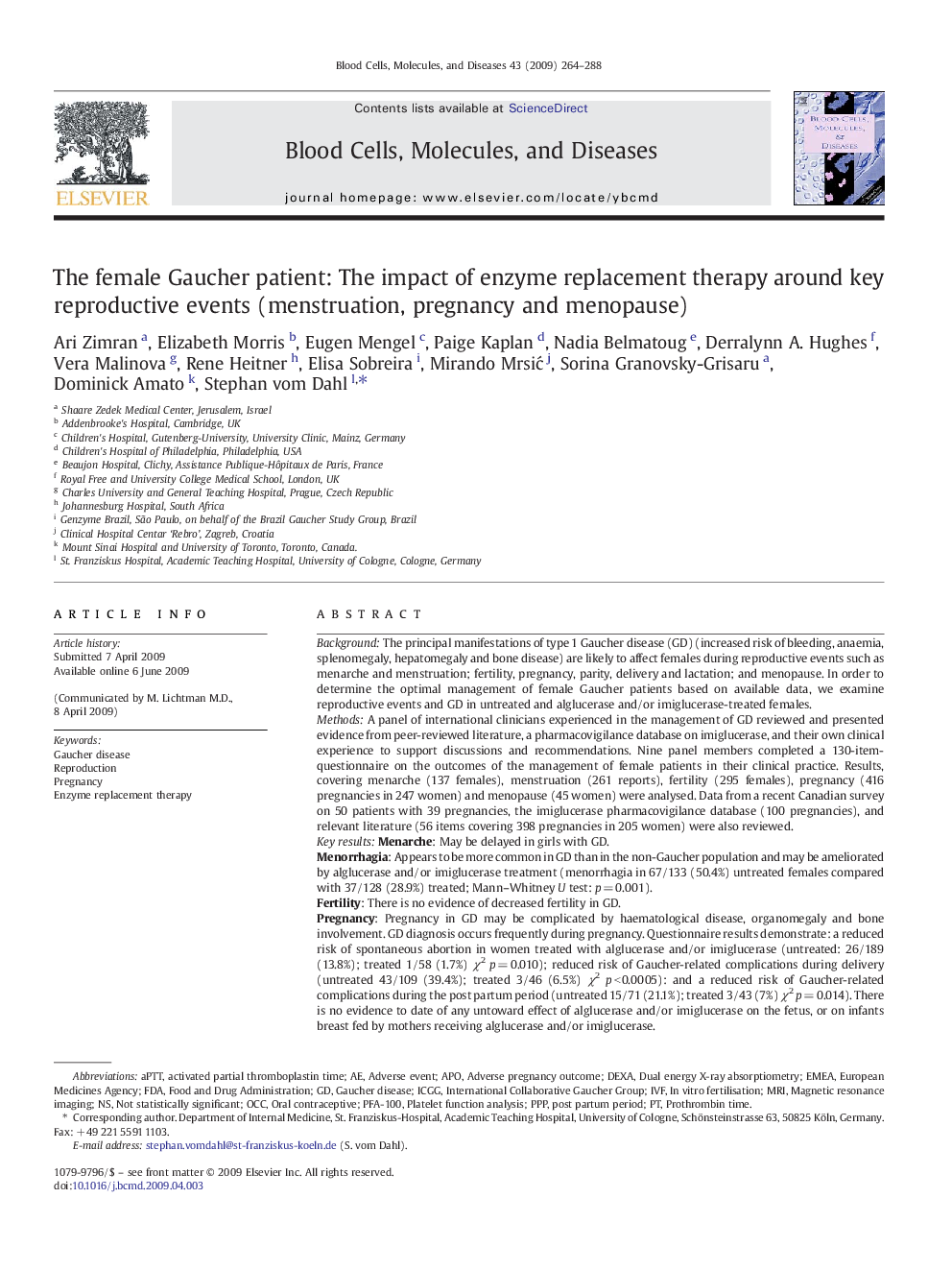| کد مقاله | کد نشریه | سال انتشار | مقاله انگلیسی | نسخه تمام متن |
|---|---|---|---|---|
| 2827941 | 1162472 | 2009 | 25 صفحه PDF | دانلود رایگان |

BackgroundThe principal manifestations of type 1 Gaucher disease (GD) (increased risk of bleeding, anaemia, splenomegaly, hepatomegaly and bone disease) are likely to affect females during reproductive events such as menarche and menstruation; fertility, pregnancy, parity, delivery and lactation; and menopause. In order to determine the optimal management of female Gaucher patients based on available data, we examine reproductive events and GD in untreated and alglucerase and/or imiglucerase-treated females.MethodsA panel of international clinicians experienced in the management of GD reviewed and presented evidence from peer-reviewed literature, a pharmacovigilance database on imiglucerase, and their own clinical experience to support discussions and recommendations. Nine panel members completed a 130-item-questionnaire on the outcomes of the management of female patients in their clinical practice. Results, covering menarche (137 females), menstruation (261 reports), fertility (295 females), pregnancy (416 pregnancies in 247 women) and menopause (45 women) were analysed. Data from a recent Canadian survey on 50 patients with 39 pregnancies, the imiglucerase pharmacovigilance database (100 pregnancies), and relevant literature (56 items covering 398 pregnancies in 205 women) were also reviewed.Key resultsMenarche: May be delayed in girls with GD.Menorrhagia: Appears to be more common in GD than in the non-Gaucher population and may be ameliorated by alglucerase and/or imiglucerase treatment (menorrhagia in 67/133 (50.4%) untreated females compared with 37/128 (28.9%) treated; Mann–Whitney U test: p = 0.001).Fertility: There is no evidence of decreased fertility in GD.Pregnancy: Pregnancy in GD may be complicated by haematological disease, organomegaly and bone involvement. GD diagnosis occurs frequently during pregnancy. Questionnaire results demonstrate: a reduced risk of spontaneous abortion in women treated with alglucerase and/or imiglucerase (untreated: 26/189 (13.8%); treated 1/58 (1.7%) χ2p = 0.010); reduced risk of Gaucher-related complications during delivery (untreated 43/109 (39.4%); treated 3/46 (6.5%) χ2p < 0.0005): and a reduced risk of Gaucher-related complications during the post partum period (untreated 15/71 (21.1%); treated 3/43 (7%) χ2p = 0.014). There is no evidence to date of any untoward effect of alglucerase and/or imiglucerase on the fetus, or on infants breast fed by mothers receiving alglucerase and/or imiglucerase.Menopause: The impact of GD on menopause requires further study especially in relation to bone pathology.ConclusionsOn the basis of this review, GD may have an impact on reproductive events in affected women. Enzyme therapy may have benefits in reducing menorrhagia, spontaneous abortions and complications associated with delivery and the postpartum period.
Journal: Blood Cells, Molecules, and Diseases - Volume 43, Issue 3, November–December 2009, Pages 264–288